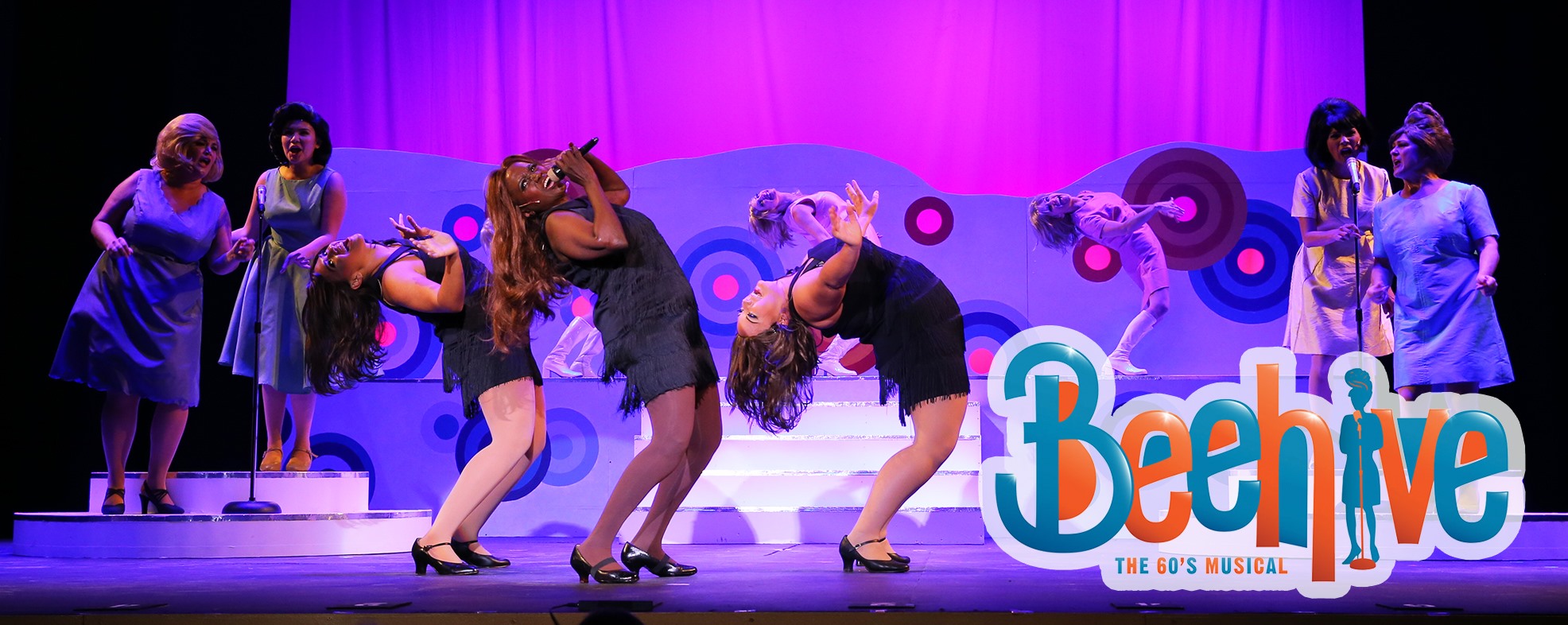The Ladies Take The Evening
Near the top of the show, “with a show of hands, can we see who has lived through the 60’s?,” asks the three hosts of the evening- Alison “Ali” Aldcroft, Alison Maldonado, and Vanessa Manuel-Mazzullo. A smattering of hands go up, but gauging the audience before and after, I feel more than a few audience members felt hesitant to answer.
What really spoke volumes was the applause after each number, the clapping along with the music when appropriate, and the smiles and revelations shared during and after the production. Nostalgia and memories both joyous and bittersweet rang forth through the house as we all laughed, cried, and softly sang along to some of America’s favorites from the 60’s.
Diamond Head Theatre’s latest production in their ‘18-’19 theatrical season is BEEHIVE: THE 60’s MUSICAL, a one-act that is filled with 40+ songs done by women throughout the 1960’s decade. Less traditional musical with plot (there is none) and more musical revue, director Malindi Fickle has gathered together phenomenal talent to represent the wide range of female voices in music from that era.
A cast of twelve takes the audience through the years, and alongside Aldcroft, Maldonaldo, and Manuel-Mazzullo stands Teresa “Weezie” Davis, Kelley Rees, Bailey Barnes, Raché Sapla, Jody Bill, Aiko Schick, Mary Calantoc, Lindsay Rabe, and Jayna Wescoatt. The structure of the show has the ladies taking the stage, singing part or all of a certain song as the hosts introduce time-based landmarks of the year/s such as certain shows and programs airing, the Kennedy assassination, all the way to Woodstock. The singing is of no question, the music is beautifully recreated (kudos to Jenny Shiroma’s musical direction as well as the band playing alongside her for bringing these tunes to life), and sometimes even added upon, with beautiful harmonies and beat changes that keep the songs fresh while maintaining their memory. Most notable is that per each song, especially (but not limited to) the slower ballads, the highlighted performer (or group) would really own the song. The songs were performed with honesty and vulnerability that it was as if they were sang and written by the performers themselves, which certainly makes the audience love the production even more. A few favorites of mine were “Will You Still Love Me” (Wescoatt, Aldcroft, Calantoc), “You Don’t Own Me” (Schick), “To Sir, With Love (Bill, company), and “River Deep/Proud Mary” (Maldonado, Sapla, Schick, comapny).
The look of the 60’s goes hand in hand with the music, and the designers did not disappoint. Rachele Rees as the production’s choreographer runs the company though the gauntlet (or the high-waisted belt) of all the 60’s grooves and moves, making it feel period appropriate and a delight to watch. Speaking of high-waist belts, Karen G. Wolfe’s costumes and Linda Lockwood’s hair & makeup gleefully take the company through the years, serving us with dazzling, iconic, and dynamic looks every few songs or so as time goes on through the 40+ program of the evening. Mathias Maas’ props were few but meaningful, like a letterman’s jacket and protest signs covering the era of the civil rights movement and the Vietnam War. Dawn Oshima’s set and lighting were carefully and deliberately chosen, as majority of the numbers did not feature her elaborate and funky set; during the more intimate and individual acts, she accents with certain lights and decorated panels to still keep the spirit of the decade while showcasing the performer onstage.
I may be young, but I relished in the hits that my parents (and their parents) grew up on. The audience of the performance I attended, no longer sheepish about living through the 60’s, gave a standing ovation to the performers. Upon walking out, I overheard a young girl asking whoever she attended the show with a question. “What was this show about? It was just music! And women! Is that it?” The answer is yes- the songs compiled tell a complex tale of the arduous path women have walked, and how it became more of a run towards equality thanks to the momentum of the 60’s. Yes, there are a few problematic songs, including the fact that a number of the songs were written by men. Despite this, the company proves that they are taking back these songs and performing them for a new age, a new time, and a brighter future.
BEEHIVE: THE 60’s MUSICAL is now running at Diamond Head Theatre through June 9. To purchase tickets, click here.
